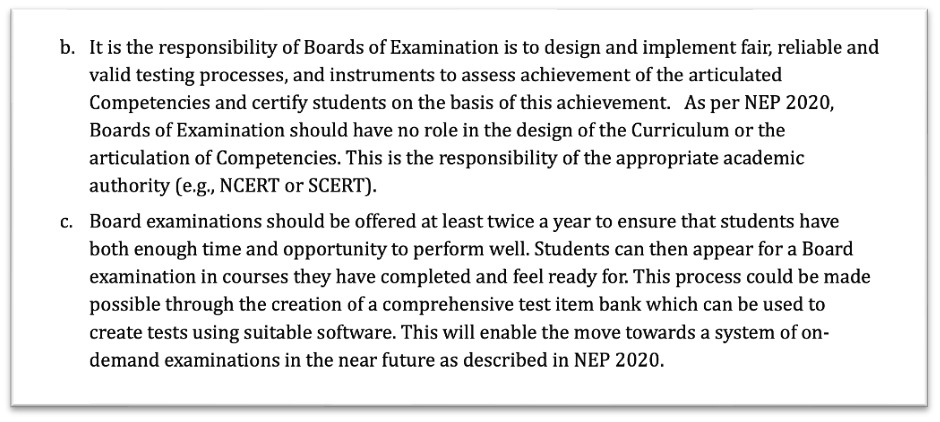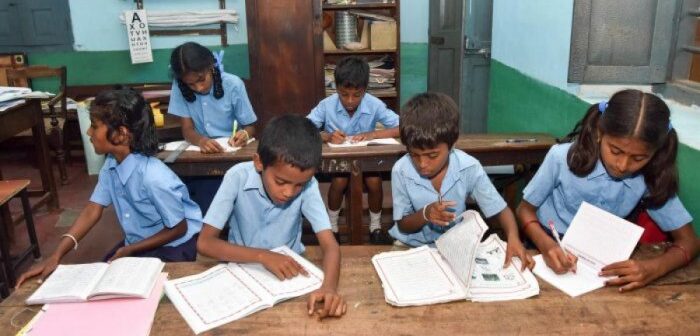The Union Ministry of Education recently released the Draft National Curriculum Framework for School Education. The draft proposes curricular frameworks in the areas of Early Childhood Care & Education (ECCE), School Education, Teacher Education and Adult Education. Here is a look at the proposed assessment structure for various levels of education.
The Union Ministry of Education recently released the Draft National Curriculum Framework for School Education (NCFSE). This is part of the New Education Policy (NEP) 2020, which envisages to develop National Curriculum Frameworks in the areas of Early Childhood Care & Education (ECCE), School Education, Teacher Education and Adult Education.
As per the information provided by the government, the framework was developed through a participatory process of deliberations where in inputs were sought from diverse stake holders including teachers, parents, students, education institutions, scholars etc.

In continuation with this approach, the NCFSE released is only a pre-draft for which feedback is solicited and there are several rounds of discussions to be carried out before we have a finalised draft of the same.
The proposals in the pre-draft do offer a new framework for the school education system in India that emphasizes on a holistic approach with focus on developing critical thinking, creativity, and problem-solving abilities among students.
One of the key areas where a new approach is envisaged is “Assessments”. Assessments provide valuable information on the student learning. There are established assessment methods in the current school education system. However, there are multiple apprehensions on the methodology and the viability of the same in ascertaining the true learning progress of the children. In this context, the new draft NCFSE proposes a new approach to conducting assessments. Here is a review of the same.
A new Four-stage schooling structure proposed in NEP 2020
A new Four-stage schooling structure envisaged in NEP 2020 forms the base for developing the National Curriculum Framework for School education. The curricular structure, content, pedagogy, assessments, etc. are defined based on this structure.
The existing schooling structure was a 10+2 system, where there were classes I to X followed by two years of further education before taking up an undergraduate programme. Year-end examinations in mostly written format were the main form of assessment. The Board exams are conducted for Class X and Class XII in the current 10+2 format.
The National Educational Policy (NEP) proposes a new 5+3+3+4 Curricular and Pedagogical structure for the ages 3 to 18 years.
The four stages are:
- Foundational
- Preparatory
- Middle
- Secondary
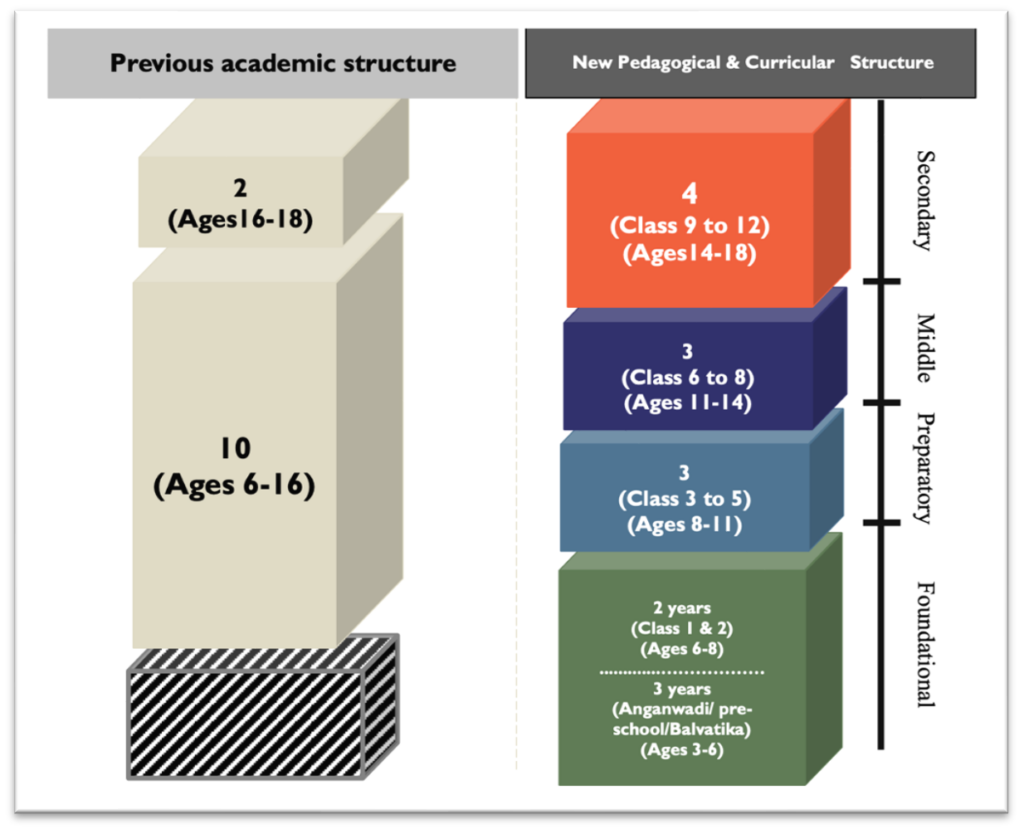
The NCFSE proposes a different approach for assessment at each of these stages. NEP 2020 proposes a shift in the assessment of schooling system from a system that is summative and primarily tests rote memorization skills to one that is – regular & formative, competency based, promotes learning and development through analysis, critical thinking, conceptual clarity, etc. NCFSE highlights the challenges with the existing assessment system in place. It recognises that assessments have become mechanical and routinised, at best focussed on measuring rote learning and at worst being an intimidating process creating fear and creating labelling of students based on the marks scored.
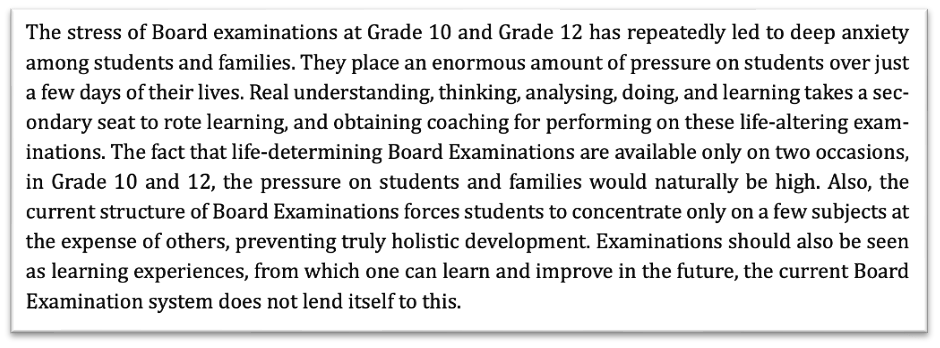
As per NCF, written assessments are inappropriate for children up to class 2
Draft NCFSE notes that explicit tests and examinations are completely inappropriate as assessment tools for the foundational stage i.e., Pre-school to Class 2 and emphasises that the assessment methods should not add to any additional burden for the child. It suggests two important assessment methods for the foundation stage in the form of observations of the child and the analysing artifacts that the child has produced as part of their learning experience.
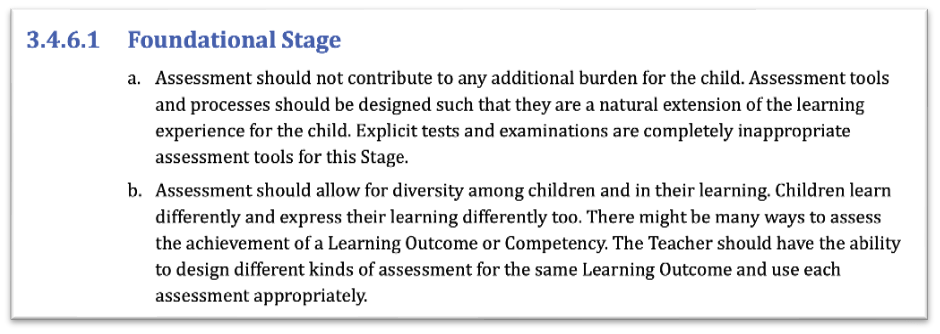
It further states that the assessment should enable recording and documentation and the progress of children should be described and analysed through systematic collection of evidence. A key aspect highlighted by NCF is that at this stage, the assessment tools ought to be a natural extension of the learning experience for the child.
The burden on the teacher is also highlighted, wherein NCF states that the assessment should not overly burden even the teacher and the teacher ought to have the autonomy to judiciously choose the appropriate tool for assessment.
Written tests, projects, presentations among others part of the assessment tools during Preparatory and middle stages
NCF proposes to introduce written tests during the preparatory stage i.e., Classes 3 to 5. However, it also stated that a variety of assessment methods including portfolios and self-assessments should also be used. Portfolios help to capture student progress holistically through their work and provides a reliable picture of their learning. NCF also suggests that Peer & self-assessment can be introduced to help students monitor their own learning.
It suggests for a comprehensive summative assessment at the end of Preparatory Stage which would assess student’s reediness to enter the Middle Stage where several new curricular elements are introduced. During the Middle Stage (Classes 6 to 8), more concepts are introduced in each subject and the focus of the curriculum moves to conceptual understanding and higher order capacities. Hence, NCF suggests classroom assessment techniques like projects, debates, presentations, experiments, investigations, role plays, etc. to be used to assess learning.
It also suggests regular summative assessments at logical intervals – year-end, term-end, or unit of learning-end. The assessments can be in the form of Multiple-choice questions and constructed responses i.e., short and long answers.
NCF also states that by the end of Middle Stage, there should be a comprehensive summative assessment of student achievement of competencies in each curricular area. Another key outcome from the assessment during the Middle Stage is to identify any special interest or inclination in specific curricular area that students may have demonstrated.
Comprehensive & regular assessment to be conducted during Secondary Stage
Developing a greater subject depth is one of the key aims during the secondary stage i.e., from Classes 9-12. Hence, NCF suggests comprehensive classroom assessments and regular summative assessments to be conducted. It also advises that assessments should focus on self-assessment where-in the students are encouraged to monitor their learning and use feedback to adjust, adapt and decide their own learning strategies.
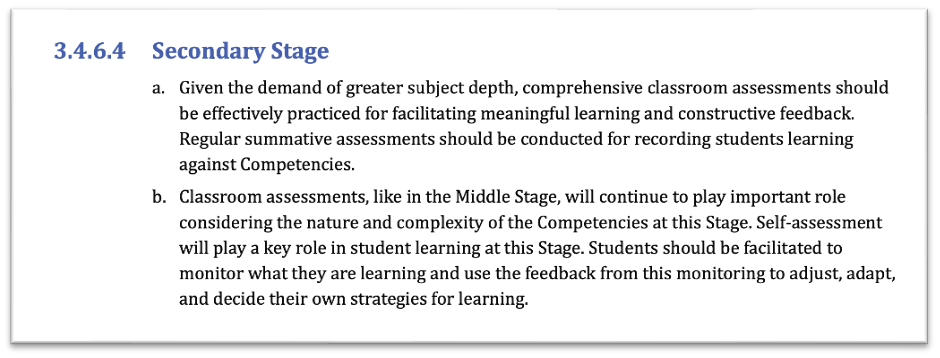
One of the key changes proposed by NCF for the Secondary stage is the introduction of eight curricular areas – Humanities, Mathematics & Computing, Vocational Education, Physical Education, Arts, Social Science, Sciences, and Interdisciplinary. Instead of dividing the students into the traditional 3 streams – Science, commerce and humanities, the students are given an option to select choice-based courses of eight curricular areas.
Board examinations to be offered twice a year
NCF highlights the challenges with the current system of Board exams in Classes 10 and 12. It notes that these two certification examinations are not consistent in ascertaining the extent to which students have achieved competencies across the curricular areas.
It notes that the major challenges include:
- Most often, the focus of the examination is on the capacity of the students to reproduce learnt facts, with most of the examinations largely testing the rote memory.
- Students can take these examinations only when they are offered once a year. NCF feels that the students’ need to have the feasibility of taking the exam when they are ready. Once in a year examination also restricts the students from having a second chance if they miss the examination.
Draft NCF has proposed a semester system to be implemented in Class 12 wherein the students have the opportunity to write the board exams twice. The final results will be a cumulative result of each of the disciplines that the student chooses based on the which the final certificate is provided. This approach of Modular Board exams is in contrast to the current single examination at the end of the year.
NCF states that its proposal that Board examinations be offered at least twice a year is to ensure that students have both enough time and opportunity to perform well. This will provide feasibility for the students to appear for a board examination in courses that they completed and feel ready. Meanwhile for Classes 9 & 10, the current structure of exams at the end of a year will be continued. For the Class 10 Board examinations, the students are required to clear eight subject examinations, which assess performance in two essential courses from each curricular area.
